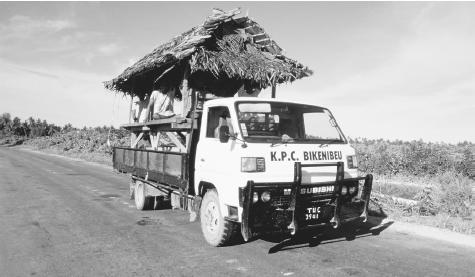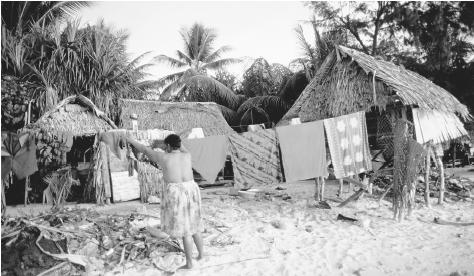Military Activity. There is no standing army. Kiribati has shown some assertiveness in its foreign relations, for example, in the 1986 fishing rights treaty that was negotiated with the Soviet Union despite strong opposition from the United States.
Nongovernmental Organizations and Other Associations
Nongovernmental organizations (NGO) include the Catholic and Protestant women's organizations and the Scouting Association and Guiding Association. An NGO of traditional healers was recently formed. Australian, British, Japanese, and American volunteer organizations are active in Kiribati.Gender Roles and Statuses
Division of Labor by Gender. Labor is divided by gender, with men fishing and collecting toddy and doing heavy construction tasks, while women handle child care and cook and keep house; both genders cultivate crops. While women may fish and often collect shellfish in the lagoon, only men may collect toddy. There is a clear status ranking in each household, which is usually headed by the oldest male unless he is too elderly to be active. The control of domestic activities lies with a senior married woman.The Relative Status of Women and Men. While Kiribati society is currently egalitarian, democratic, and respectful of human rights, in the traditional culture women occupy a subordinate role. Job opportunities for women are limited, and there is no

A new home in transit on the back of a truck in Tarawa. Rural houses are built with traditional materials while imported materials are used for homes in towns.
Marriage, Family, and Kinship
Marriage. Although historically polygamy was practiced, the marriage system is now monogamous. Arranged marriages remain common, especially in rural areas. "Love matches" and elopements have become more common and are tolerated by most families. Virginity tests of the bride remain valued despite criticism by churches. Marriage is almost universal, and divorce is unpopular and uncommon.Domestic Unit. The household is commonly based on a single nuclear family and may include aging parents and adoptive kin. Patrilocal residence remains common in rural areas, with married women moving to live on the husband's kainga .
Kin Groups. The main kinship units are mwenga ("household"), utu ("related family"), and kainga. Membership in mwenga is determined by residence, in utu by kin relations, and in kainga by common property holding and descent from a common ancestor. Inheritance of property and kinship are traced through both the mother's and the father's families. Adoption is widely practiced, especially between close kin.
Socialization
Infant Care. In this pro-natal society, infants are showered with attention and care by both parents and by the extended family. In the first few months after a birth, the mother stays in the house with the baby, and breast-feeding on demand is standard until at least six months of age. Kiribati has one of the highest infant death rates in the world as a result of diarrheal disease and respiratory infection.Child Rearing and Education. After infancy, care by siblings, especially sisters, is very common, even by siblings as young as eight years. Children are indulged until they are about four years old, after which they become subject to strict parental and kin authority reinforced by corporal punishment. Crying and emotional outbreaks are not tolerated, and a good child is obedient, helpful, and respectful. By age eight or nine, children are expected to start helping around the house.

Beach houses in Tarawa, Kiribati, consist of thatched roofs and native wood.
Schooling is compulsory for children from age six. Approximately 20 percent of primary students go on to receive secondary education. Education is highly valued by parents as a means of increasing their children's wage-earning abilities.
Higher Education. Higher education is expanding and increasingly valued. Kiribati participates with eleven other Pacific Island countries in funding the University of the South Pacific with its main campus in Suva, Fiji. Technical education is available in South Tarawa at the Teacher's Training College, Tarawa Technical Institute, and the Marine Training Centre.
Etiquette
The most important aspect of etiquette for locals and guests involves behavior in the maneaba , where there are appropriate places and ways to sit and interact. In all aspects of life, humility and humbleness are admired. Direct eye contact is uncommon, and it is inappropriate to look directly at one of higher status or cut between the gaze of talking individuals. Touching of heads is considered extremely intimate, and the top of the head is a taboo area. Modest dress is important for women, and cleanliness of the body and clothing is valued.Religion
Religious Beliefs. According to I-Kiribati mythology, the giant spider Nareau was the creator, followed by spirits ( anti ), half spirits, half humans, and finally humans. The anti were the most important figures in I-Kiribati worship before Christian missionaries arrived, and they remain respected in everyday life.Conversion activity began in 1852 with the arrival of Protestant missionaries. There was a rivalry between the Catholic and Protestant missions, resulting in deep-seated animosities that remain as an undercurrent in national and island politics. Just over half of all I-Kiribati are Catholic, almost half are Protestant, and the remainder are Seventh-Day Adventist, Baha'i, and members of the Church of God and the Church of Latter-Day Saints.
Medicine and Health Care
Life expectancy is low, and the most common causes of adult death are infectious diseases, including tuberculosis. Liver cancer is a common cause of male death, exacerbated by widespread infection with hepatitis B and heavy alcohol use. There have been several cases of AIDS. Traffic-related accidents are increasing.While a new central hospital was completed in Tarawa in 1992 and the Ministry of Health and Family Planning provides free medical care in most villages, medical supplies and services are not always available. A pluralistic system of traditional herbal and massage treatments is maintained alongside biomedical services, and many women give birth at home. Healing traditions are passed on as special knowledge within families.
Secular Celebrations
The most important holiday is the annual celebration of independence on 12 July, which includes sports competitions, parades, and feasts. Other national holidays include New Year's Day, Easter, Christmas, and Youth Day (4 August)Read more: http://www.everyculture.com/Ja-Ma/Kiribati.html#ixzz2JntXGoT6